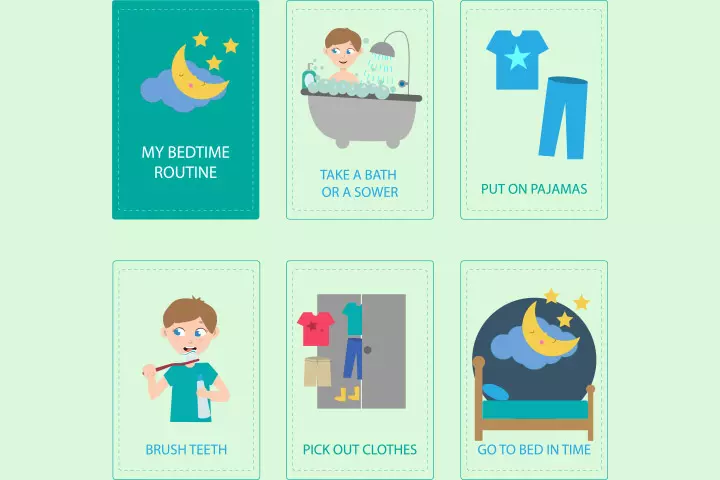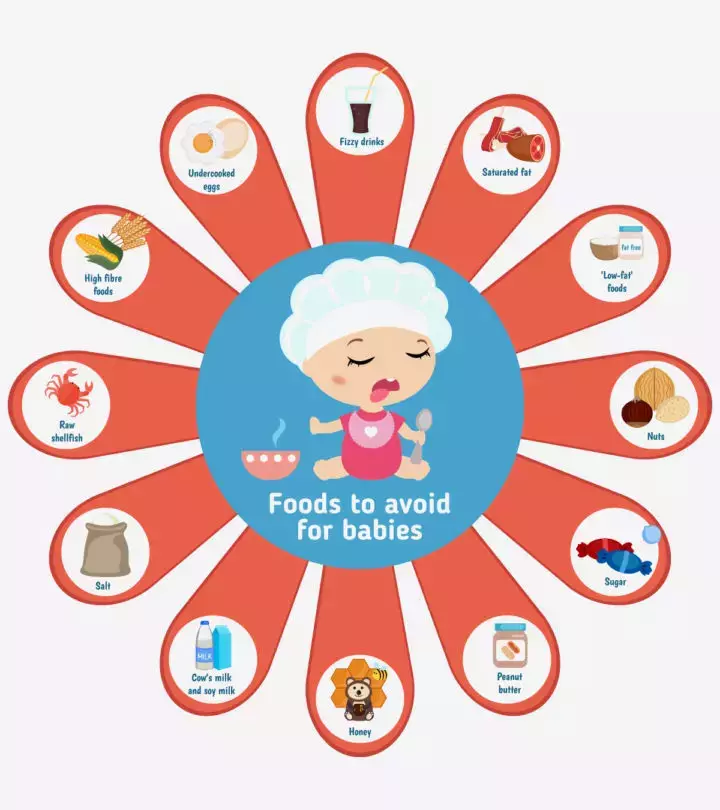
Image: ShutterStock
Toddler tantrums at bedtime can be challenging, making it difficult to put a baby to sleep. However, understand that tantrums are a part of a child’s normal development. They often occur out of discomfort, hunger, frustration, or tiredness (1).

Toddlers use verbal communication to express themselves freely by the age of two. However, they may still struggle to convey their thoughts clearly, hence the tantrums. These tantrums could be classified as exhaustion or fatigue, temper, and frustration tantrums. While some toddlers participate in it rarely, others may do it quite often.
Read to find out the possible reasons behind these tantrums and a few tips for managing them.
Key Pointers
- Your toddler’s bedtime tantrums may disrupt your and their sleep pattern.
- Illness, fear of the unknown, separation anxiety, and hunger are some reasons why a toddler shows tantrums.
- Establishing a bedtime routine, playing relaxing music, giving a shower are a few ways to manage bedtime tantrums effectively.
Why Do Toddlers Suddenly Start Crying At Bedtime?

While tantrums are common, if your toddler throws a tantrum or displays resistance at bedtime, it can be a frustrating experience for you. When toddlers throw tantrums to evade sleep at night, it can affect not just their sleep schedule but yours too.
Knowing the reasons behind a toddler screaming, crying, yelling, whining, or throwing tantrums at bedtime can help you resolve their issue and get them to bed as early as possible. Here are a few probable reasons why your toddler throws tantrums at bedtime.
- Illness: This is one of the most common reasons why your child throws a tantrum during bedtime. Toddlers are usually unaware of how to react when they are unwell (2).
- Fear: Fear of the unknown or darkness, episodes of nightmares, or just the fear of you not being around can be traumatic for young children. It can cause them to cry at bedtime.
- Fear of separation: If you do not spend enough time with your toddler, or if they feel so, they might cry out of fear that they will be separated from you again when they sleep (3).
- Tiredness: An overtired toddler can get very cranky and restive. They could refuse to sleep and may exhibit restlessness (4).
- Insufficient physical activity: If your toddler is less tired or has not had sufficient physical activity, they may refuse to go to bed on time or throw a tantrum.
- Hunger or thirst: If your baby is hungry or thirsty and is unable to communicate it, they may cry or display irritability during bedtime.

- Discomfort: Dry, irritating clothes, a warm atmosphere, dry skin, or rashes on the skin can cause children to cry. These issues can also lead to a toddler waking up at night.
How To Deal With Your Toddler’s Bedtime Tantrums?
Here are a few tips that can help you manage your toddler’s bedtime tantrums.
1. Establish a bedtime routine

Put your toddler to bed at the same time each night. This will help your child know that it is bedtime and condition them to fall asleep faster (2). Since children of different ages sleep for a different number of hours, you may have to modify their bedtime routine based on their age.
 Experts say
Experts say2. Maintain consistency
Maintain consistency in what your toddler is supposed to do or not do during bedtime. As they grow up, make sure they know what their boundaries are and stick by them, as this gets them to wind down in time.
3. Do some activities the hour leading up to bedtime
The hour leading to your toddler’s bedtime is crucial to their night’s sleep. Indulging them with screened devices or other distractive activities is not recommended. Reading them a story or playing soothing music is a great way to put them to bed.
Sharing her experience dealing with her daughter’s bedtime tantrums, a mother of two says, “I added an extra half hour to her routine called reflection time. Lights off without any crazy noises. During this time, we hummed our favorite nursery rhymes; yes, we hummed! Starting at the normal tone with our hands in the air and taking it down to a whisper while we moved lower and lower into the bed until we were lying down, stretched out flat! Surprisingly she not only took this as a sign that the dat was done, but also went straight to sleep after her usual prayer (i).”
4. Give them a choice

Give your toddler a choice and make them in charge of what they wish to do during bedtime (2). Let them choose their favorite toy for the night or the pajama they wish to wear to bed.
5. Play soothing music
Some children love to sleep to music or a soothing song. If your child is one of them, play their favorite lullaby or relaxing music that instantly calms them and puts them to sleep.
6. Give them a bath or shower
A warm bath before bedtime is absolutely comforting and soothing. If your child has trouble sleeping or gets cranky before bedtime, give them a warm bath and watch them sleep peacefully.
 Quick tip
Quick tip7. Maintain a reward chart

One of the best ways to inculcate good habits in your child is by rewarding them when they behave well. One good habit that you can teach them is getting to bed early and waking up early. You can get them to wind down for the night by creating a reward chart. Reward your child every time they go to bed on time. This acts as a positive reinforcement, and they are more likely to be early risers too. Also, this could help reduce their bedtime fussiness or defiance.
While managing tantrums, it is important for you to keep in mind to not give babies attention mid-tantrum. This is a teaching that they have to scream at this intensity or do excessive kicking to get your attention. Therefore, ensure to actively ignore your little one while they are throwing a tantrum.
Frequently Asked Questions
1. How long will a toddler tantrum last?
A typical toddler tantrum may last for two to 15 minutes, and your child usually calms down afterward. But if the screaming lasts violently for more than 15 minutes, it is better to take your child to a doctor (5).
2. What should I not do when my child throws a tantrum?
Things not to do when your child throws a tantrum:
- Don’t dismiss their emotions and feelings
- Don’t say that their behavior is making you sad
- Don’t use sarcasm
- Don’t tell them to “shake it off” and move on
3. What long-term effects can occur when toddlers experience bedtime anxieties?
Bedtime anxiety in toddlers can affect their sleep, and lack of proper and adequate sleep can impact their overall health. It can affect their cognitive development, ability to focus, and self-regulation and cause adverse health outcomes such as emotional problems and depression (8).
4. Why is it important to understand your toddler’s emotions?
Understanding toddler emotions is crucial for fostering emotional growth. Parents need to recognize and validate their child’s feelings, such as fear or frustration, during tantrums. By calmly acknowledging these emotions, parents help their toddlers feel secure, understood, and supported. This approach strengthens the parent-child bond and teaches toddlers how to process their emotions healthily. Over time, this practice can reduce the intensity and frequency of tantrums, promoting better emotional regulation and communication skills.
Toddler tantrums at bedtime are an unavoidable phenomenon. However, the number of hours a toddler needs to sleep depends on their age. As newborns grow, their sleep requirement reduces. But toddlers need to get a good amount of sleep to process their thoughts clearly and develop further. Though it is normal for your toddler to throw tantrums before bedtime, ensure that they do not continue for a long time. You can identify their cause of unrest and irritation and use some tips so they get enough sleep.
Infographic: Reasons Why A Toddler Throws Tantrums During Bedtime
Dealing with a toddler who doesn’t want to sleep and throws tantrums every night can be annoying and stressful for many parents. However, it’s important to understand why your toddler is throwing tantrums. Check out the infographic below to learn about some reasons toddlers may throw fits before bedtime.
Some thing wrong with infographic shortcode. please verify shortcode syntaxAre you experiencing trouble managing your child’s tantrums? Watch our video to learn what to do when your child has a tantrum and how to help them calm down.
Personal Experience: Source
MomJunction articles include first-hand experiences to provide you with better insights through real-life narratives. Here are the sources of personal accounts referenced in this article.
i. Bedtime tantrums resolved!https://letterstomybaby1.wordpress.com/2016/01/20/tales-of-bedtime-tantrums/
References
1. Temper Tantrums; The Nemours Foundation
2. Temper tantrums in toddlers: How to keep the peace; Mayo Foundation for Medical Education and Research (MFMER)
3. Six Ways to Stay Calm When Your Child Cries and Cries at Bedtime; Hand In Hand Parenting
4. Settling 1-3 years; Tresillian
5. Temper Tantrums; Cleveland Clinic
6. Toddlers (2-3 years old); CDC
7. Do Your Children Get Enough Sleep?; CDC
8. Coping With Your Child’s Bedtime Anxiety And Insomnia; Clarity Child Guidance Center
Community Experiences
Join the conversation and become a part of our nurturing community! Share your stories, experiences, and insights to connect with fellow parents.
Read full bio of Dr. Raju C Shah
Read full bio of Rohit Garoo
Read full bio of Dr. Ritika Shah
Read full bio of Vidya Tadapatri

















